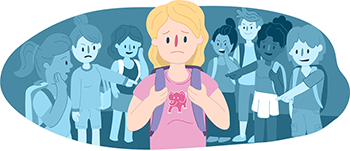|
Bullying is repeated behaviour that:
 is harmful; is harmful; - targets a certain person or group of people; and
- embarrasses, dominate or intimidates the person being bullied.
It may include:
- verbal insults like teasing, name-calling, harassing;
- physical behaviour like hitting, kicking, pushing;
- “mucking about” that goes too far;
- cyber-bullying like offensive messages or posts on social media; or
- anti-social behaviour like exclusion, gossip, spreading rumours or offensive gestures.
- Bullying can happen anywhere like at school, in parks, on your way to school, in other places used by the school or online.
Is bullying illegal?
Bullying at school
All schools have a responsibility to take reasonable steps to protect the health, safety and wellbeing of their staff and students. This includes taking steps to support students who are being bullied by their peers. This can include being pulled by classmates outside of school hours or off school property e.g. being cyber bullied. It should have a clear procedure for students to report bullying, and provide support for students who have been affected by bullying. If you go to a public school, this will include having an anti-bullying plan in place to deal with bullying and cyberbullying.
You can ask your school about their anti-bullying plan and see what the school is doing to stop bullying from happening.
I’m being bullied at school – what can I do about it?
 Bullying is not ok and you don’t have to put up with it. You have the right to feel safe. You may be able to solve the problem by just ignoring the bully. But if you feel threatened, or you are being bullied at school or outside school, you tell someone about what is happening to you. Someone at your school should respond to the situation. Bullying is not ok and you don’t have to put up with it. You have the right to feel safe. You may be able to solve the problem by just ignoring the bully. But if you feel threatened, or you are being bullied at school or outside school, you tell someone about what is happening to you. Someone at your school should respond to the situation.
Lodge a formal complaint with your school
The school has a legal duty to do something about the bullying if it is happening at school. If telling someone is not enough to stop the bully’s behaviour, you can make a formal complaint to the school.
Make a complaint to the Department of Education or other governing body.
Bullying. No Way! This website contains information and support for students on how to handle situations of bullying.
The Allen Adventure – (App) is a fun interactive story about Allen, a young visitor from another planet, who is new to school and learning how to get on with his Earthling classmates. Free app to download.
Legislation
Commonwealth legislation relevant to bullying, harassment, discrimination and violence include:
- Disability Discrimination Act 1992
- Human Rights and Equal Opportunity Commission (HREOC) Act 1986
- Racial Discrimination Act 1975
- Racial Hatred Act 1995
- Sex Discrimination Act 1984.
The Attorney-General’s Department provides information and access to various Commonwealth, State and Territory Acts relating to human rights and anti-discrimination.
Policies
Policies are frequently amended and updated. A small number of relevant policy links are listed below by jurisdiction. For more detailed and current information regarding any policy, it is recommended you refer to your local education authority website.
The Catholic Education Commission in each state or territory has relevant information. Independent schools are autonomous and governed by their own school boards. For policies regarding in independent school please contact the school directly.
Make a report to the police – If someone has been or has threatened to be physically violent to you or sexually harassing you, you can report this to the police.
Seek protection from police – Courts are able to make a protection order to protect you from people who are stalking or bullying you. The exact orders will depend on the individual case and may impose certain conditions and restrictions on the bullies such as keeping them apart from you in school.
Take legal action – In some instances you and your parents can take legal action against the bullies or the school. This is because the school has a “duty of care” to ensure the safety of all its students by requiring a regular level of teacher supervision. In simple terms, this means that the school must ensure that there are enough teachers around that will make sure any cases of bullying are observed and dealt as often as possible.
If deciding to take this approach it’s important to be aware of any time limitations.
Queensland
Department of Education
- Safe, supportive and disciplined school environment procedure
- Code of school behaviour
- Responsible behaviour plan for students
- Positive Behaviour for Learning (PBL)
- Inclusive education policy
- Supporting students’ mental health and well-being policy
Queensland Catholic Education Commission
Independent Schools Queensland
|


 is harmful;
is harmful;  Bullying is not ok and you don’t have to put up with it. You have the right to feel safe. You may be able to solve the problem by just ignoring the bully. But if you feel threatened, or you are being bullied at school or outside school, you tell someone about what is happening to you. Someone at your school should respond to the situation.
Bullying is not ok and you don’t have to put up with it. You have the right to feel safe. You may be able to solve the problem by just ignoring the bully. But if you feel threatened, or you are being bullied at school or outside school, you tell someone about what is happening to you. Someone at your school should respond to the situation.